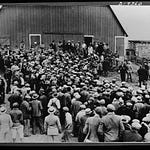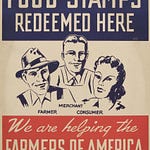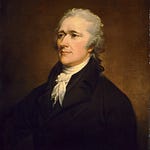
How do Americans regard John Locke’s principle of self-ownership?
Across the political spectrum, Americans believe in an individual’s right to own themselves, their property, and the product of their labor. Conservatives might interpret self-ownership in terms of economic freedom and property rights. Progressives might focus more on personal liberties and rights in healthcare, reproductive rights, and freedom of expression. Libertarians might interpret self-ownership as the right to make decisions about one’s body, privacy, and personal life without coercion or control by the state.
Though we express this belief differently, we all believe in John Locke’s fundamental concepts of life, liberty, and property.
And we express this belief by voting.
Englishman John Locke (1632-1704) was a philosopher and physician. He is the original source of individualism and, therefore, American theory.
Locke penned his most influential works late in the 17th century. He wrote his seminal Two Treatises of Government (1689) while exiled in the Netherlands. Locke’s two treatises:
Locke first refuted the concept of the divine right of kings.
Locke then outlined modern representative democracy. He argued for social contract theory, positing that governments exist with the consent of the governed and must protect the natural rights of life, liberty, and property.
Locke’s influence extended beyond philosophy into political theory, education, and theology. His ideas on religious tolerance were particularly forward-thinking for his time, advocating for the separation of church and state.
Locke’s ideas became fundamental to the American Revolution and the creation of the United States Constitution.
Locke’s broad ideas are, in essence, an outline of the US Constitution. From Two Treatises of Government, they include:
First, a foundation of natural rights, which Locke defined as life, liberty, and property. These ideas heavily influenced Thomas Jefferson when Jefferson drafted the Declaration of Independence, where he famously wrote about “unalienable rights,” including “life, liberty, and the pursuit of happiness.”
Second, our government exists as a social contract wherein the representatives serve with the consent of the governed. This concept underpins the Constitution’s provision for a government that derives its power from the consent of the governed.
Third, we prevent institutional tyranny through the separation of powers. Our Constitution structure includes a system of checks and balances among the government's legislative, executive, and judicial branches.
The structure of our republican representative democracy, which flows from our Constitution’s structure, flows from Locke’s theories.
Servants of the nation swear allegiance to our Constitution. Because Locke’s theories outline our Constitution, national servants (elected officials), intentionally or not, believe in John Locke’s ideas: natural rights, representatives serving their constituents, and preventing institutional tyranny.
If we as a nation structure our society based on Locke’s theories, do we support Locke’s theory of property as a natural right? Jefferson changed it in the Declaration of Independence to the pursuit of happiness. Jefferson broadened the scope of natural rights to a more holistic view of what it means to live a free and fulfilling life. By the time of the American Revolution, thinkers like Jefferson interpreted enlightenment ideas to emphasize not just material wealth and property but broader human well-being and fulfillment concepts. “The pursuit of happiness” reflects this more comprehensive enlightenment thought, focusing on individual fulfillment in a more holistic sense.
In contrast, Locke’s original premise was that everyone owned property. He argued that property is a natural right stemming from an individual’s right to own themselves and the product of their labor. According to Locke, people own themselves, and when a person works on something from nature, their labor is mixed with the resource, making it their property. Following this line of reasoning, since we possess ownership over ourselves, we inherently direct the autonomy of our bodies and maintain the right to make choices that serve our interests.
The government cannot grant natural rights; natural rights are inherent in the state of nature. The transition from natural rights to civil society, as Locke posits, involves individuals consenting to form a government. Citizens consent to governance with the understanding that the government’s primary role is protecting these natural rights.
Locke’s philosophy transforms at the transition point of joining natural rights and civil society. His principles become not just about individual rights in isolation but about how these rights are essential in the formation and functioning of a modern democratic society. This broader context is crucial in understanding Locke’s enduring influence on American political thought.
Because Jefferson changed the term “property” to “pursuit of happiness,” do Americans believe, like Locke did, that we own ourselves?
Yes. Americans believe in an individual’s right to self-ownership.
Conservatives might interpret self-ownership in terms of economic freedom and property rights. They emphasize the importance of individual responsibility and the freedom to pursue financial success without excessive government intervention.
Progressives might focus more on personal liberties and rights in healthcare, reproductive rights, and freedom of expression. They often advocate for a role of government ensuring individuals have the resources and opportunities to exercise their rights fully, viewing self-ownership as a matter of property and economic freedom but also of personal autonomy and social justice.
Libertarians stress the importance of individual autonomy in all aspects of life, advocating for minimal government intervention. They might interpret self-ownership as the right to make decisions about one’s body, privacy, and personal life without coercion or control by the state.
In sum, Americans believe in an individual’s right to self-ownership.
No matter the group you associate with (if any), the logic is that if we don’t own ourselves, we are not free to pursue our life goals, find happiness, and seek personal fulfillment. In American culture and legal understanding, this concept has evolved to include various aspects of personal autonomy, such as freedom of speech, freedom of and from religion, and the right to privacy. We see these rights as integral to an individual’s ability to pursue their version of happiness.
Further, American voters believe in an individual’s right to self-ownership. Right now, American voters are expressing this belief by voting for other Americans to have the right to make their own healthcare decisions. John Locke’s theory of self-ownership, 319 years after his death, keeps winning elections.
Conservatives, progressives, and libertarians alike believe in Locke’s theory. And why shouldn’t we? Locke’s ideas formed our national system. Though the Constitution framers didn’t adopt the language verbatim, we believe in natural rights, the social contract that exists between our representatives and the consent of the governed, and keeping in check the tyranny of the institution just in case the institution tries to tell us we can’t make decisions in line with our natural rights.
How do Americans regard John Locke’s principle of self-ownership?
Across the political spectrum, Americans believe in an individual’s right to own themselves.
The diverse interpretations of self-ownership across the political spectrum — from conservative to progressive and libertarian—highlight this concept’s dynamic nature in shaping American policy and law. Locke’s self-ownership principle will likely continue playing a critical role in American political discourse.
Further, we don’t just say we believe in Locke’s principle. American voters believe in an individual’s right to self-ownership and, by extension, the right to make their own healthcare decisions in line with this natural right.
May God bless the United States of America.












